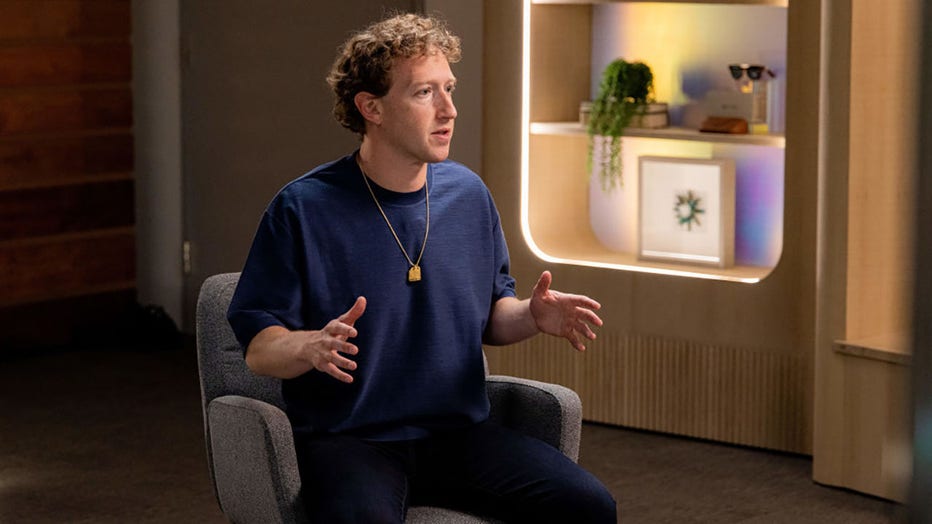Mark Zuckerberg letter: White House pressured Facebook over some COVID content during pandemic
Zuckerberg says Meta was "pressured" by Biden White House
LiveNOW from FOX host Mike Pache spoke to Fox News Correspondent Griff Jenkins on the latest
WASHINGTON - Meta CEO Mark Zuckerberg said pressure by senior Biden administration officials for Facebook to "censor" some COVID-19 content during the pandemic was "wrong," and said the social media company would resist similar attempts in the future.
In a letter dated Aug. 26, Zuckerberg alleged that the officials, including those from the White House, pressured Facebook for months to take down "certain COVID-19 content including humor and satire."
The officials "expressed a lot of frustration" when the company didn't agree, he wrote in the letter, which was addressed to Rep. Jim Jordan, the Republican chair of the House Judiciary Committee.
Zuckerberg vowed that the social media giant would "push back" if it faced such demands again.

FILE - Mark Zuckerberg, chief executive officer of Meta Platforms Inc., during an interview on "The Circuit with Emily Chang" at Meta headquarters in Menlo Park, California, on July 18, 2024. Photographer: Jason Henry/Bloomberg via Getty Images
"I believe the government pressure was wrong and I regret that we were not more outspoken about it," wrote the CEO of Meta, the parent company of Facebook, Instagram and WhatsApp.
"I also think we made some choices that, with the benefit of hindsight and new information, we wouldn’t make today," he said, without elaborating. "We’re ready to push back if something like this happens again."
White House response to Mark Zuckerberg's letter
The White House said in response to the letter that, "When confronted with a deadly pandemic, this Administration encouraged responsible actions to protect public health and safety."
"Our position has been clear and consistent: we believe tech companies and other private actors should take into account the effects their actions have on the American people, while making independent choices about the information they present," the statement added.
AI expert: Expect 'tsunami' of 2024 misinformation
Austin Westfall speaks with Dr. Oren Etzioni of the Allen Institute for AI and the University of Washington. They discuss the implications of artificial intelligence during the 2024 election, including the dangers of deep fakes.
Debate over social media efforts to target misinformation
The letter underscored the debate over efforts to target misinformation around the coronavirus pandemic during and after the 2020 presidential election, particularly as allegations have emerged that some posts were deleted or restricted wrongly.
Experts warn this year's U.S. election could be swamped by misinformation on social media with the proliferation of artificial intelligence and other tools to produce false news stories and content that could mislead voters.
In April 2020, just as COVID-19 had led to global shutdowns and radical changes in everyday life, Facebook moved to warn users who shared misinformation about COVID-19.
In early 2021, Facebook added what Zuckerberg called labels with "credible information" to posts about COVID vaccines. In August 2021, Facebook said it had removed more than 20 million pieces of content from Facebook and Instagram globally for violating policies on COVID-19-related misinformation, as well as over 3,000 accounts, pages, and groups.
Conservatives have long derided Facebook and other major tech companies as favoring liberal priorities and accused them of censorship.
RELATED: SCOTUS sides with Biden administration in social media case
Zuckerberg has tried to change the company’s perception on the right, going on podcaster Joe Rogan’s show in 2022 and complimenting Republican nominee Donald Trump’s response to an assassination attempt as "badass."
He sent Monday’s letter to the House Judiciary Committee, whose chairman, Jordan, is a longtime Trump ally.
Zuckerberg gets grilled over Meta child exploitation
Social media leaders testify to Senate on child exploitation hearing.
Zuckerberg letter: ‘My goal is to be neutral’
In the letter, Zuckerberg also said he would no longer donate money to widen election access for voters through the Chan Zuckerberg Initiative, the company that runs the philanthropy for him and his wife, Priscilla Chan.
The couple previously donated $400 million to help local election offices prepare for voters in the 2020 presidential election, with funds used for protective equipment to prevent the spread of the coronavirus at polling sites, drive-thru voting locations and equipment to process mail ballots.
"I know that some people believe this work benefited one party over the other," despite analyses showing otherwise, he said.
"My goal is to be neutral and not play a role one way or another - or to even appear to be playing a role," Zuckerberg wrote. "So I don’t plan on making a similar contribution this cycle."

